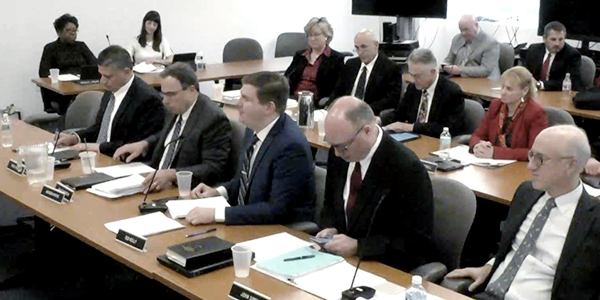By Michael Kuser
The New York Public Service Commission on Thursday placed new restrictions and requirements on energy service companies (ESCOs) that they must honor and fulfill in order to sell to the state’s residential customers and small business owners (15-M-0127, 12-M-0476, 98-M-1343).
“This order to me is a reset,” PSC Chair John B. Rhodes said. “It clearly delineates what is no longer permitted on the foundational principle of protecting customers, and it acts against companies that have acted badly.”
The PSC said that “little has changed in New York’s retail energy market since 2014, when the commission observed that complaint rates related to ESCOs were high.”
In the past few years, the commission has waged a continual struggle to balance the idea of free markets and free choice with accountability for unscrupulous business practices. (See “PSC Continues Crackdown on ESCOs,” NYPSC Approves Higher Rates for Bitcoin Miners.)
The commission and Department of Public Service staff recently concluded hearings before two administrative law judges, the transcripts of which total 4,233 pages.
The PSC’s order said that the non-ESCO parties, including the state’s Utility Intervention Unit, the attorney general, the Public Utility Law Project of NY (PULP), New York City and AARP, “all agree that the current retail access market does not benefit customers. Some argue the commission should shut down the market entirely, while others argue that the commission should implement systematic and substantial reforms to limit ESCO products and/or ESCO prices.”
DPS staff said that ESCO customers paid $1.2 billion more than utility customers would have paid for commodity service during the 36-month period ending Dec. 31, 2016.
“In general, the ESCO parties believe that little or nothing is wrong with the retail access market and argue that commission interference with ESCOs’ current access to customers is unwarranted,” the commission said. It added that last year saw ESCO customer numbers drop 12% compared to the previous year, to 2 million.
The ESCO parties included the National Energy Marketers Association, the Retail Energy Supply Association, Direct Energy, Agway, Constellation, Great Eastern Energy, Impacted ESCO Coalition and Infinite Energy.
The new regulations include enhanced eligibility criteria and increased scrutiny of business practices, more clear ESCO product and pricing information, and prohibitions on marketing gimmicks that lack energy-service-based value, such as sporting event tickets and gift cards.
The PSC also revoked the eligibility of Atlantic Power and Gas to participate in the state’s retail energy market after finding the company guilty of “a pattern of persistent disregard” for the commission’s consumer protections and “either unwilling or unable to observe the required business practices, even after having its eligibility to market to and enroll residential and nonresidential customers revoked in 2017” (16-M-0618).
Yes to Consolidated Billing for CDG
The commission also approved consolidating the utility bills of community distributed generation (CDG) customers, relieving project sponsors of the need to bill separately for the subscription charge and making it easier for consumers to see their energy benefits in one statement (19-M-0463).
The PSC has been developing the value of distributed energy resources (VDER) mechanism and promoting the growth of CDG for several years. (See NYPSC Refines Value Stack, Boosts Community DG.) CDGs allow customers not positioned to take advantage of rooftop solar installations to directly participate in renewable energy programs.
Thursday’s order directs utilities to automatically deduct the subscription charges a customer pays its CDG providers from the net renewable energy credits applied to the customer’s bill and send the money to the CDG project sponsor based on a percentage set by the sponsor.
“As this percentage must be below 95%, CDG members participating in consolidated billing will receive a guaranteed bill reduction, and therefore guaranteed monthly savings, of at least 5%,” the commission said.
Several state utilities — Central Hudson Gas & Electric, Consolidated Edison, New York State Electric and Gas, Niagara Mohawk Power, Orange and Rockland Utilities, and Rochester Gas & Electric — submitted comments urging the commission to “consider whether such changes are warranted given the cost and time to implement and determine the proper mechanism for funding the transition to different billing mechanisms.”
The utilities argued that “a reasonable approach would provide for full recovery of all upfront and ongoing costs associated with implementing a new billing approach while also requiring the CDG host to pay for utility billing services.”
The commission also rejected National Grid’s proposal to compete for and acquire CDG customers and reduced the company’s proposed fee for consolidated billing by 90%, allowing the same 1% fee provided to other utilities.
The Alliance for a Green Economy, the Green Education and Legal Fund, and Joule Assets submitted comments in favor of consolidated billing, as did New York City and many smaller municipalities.





